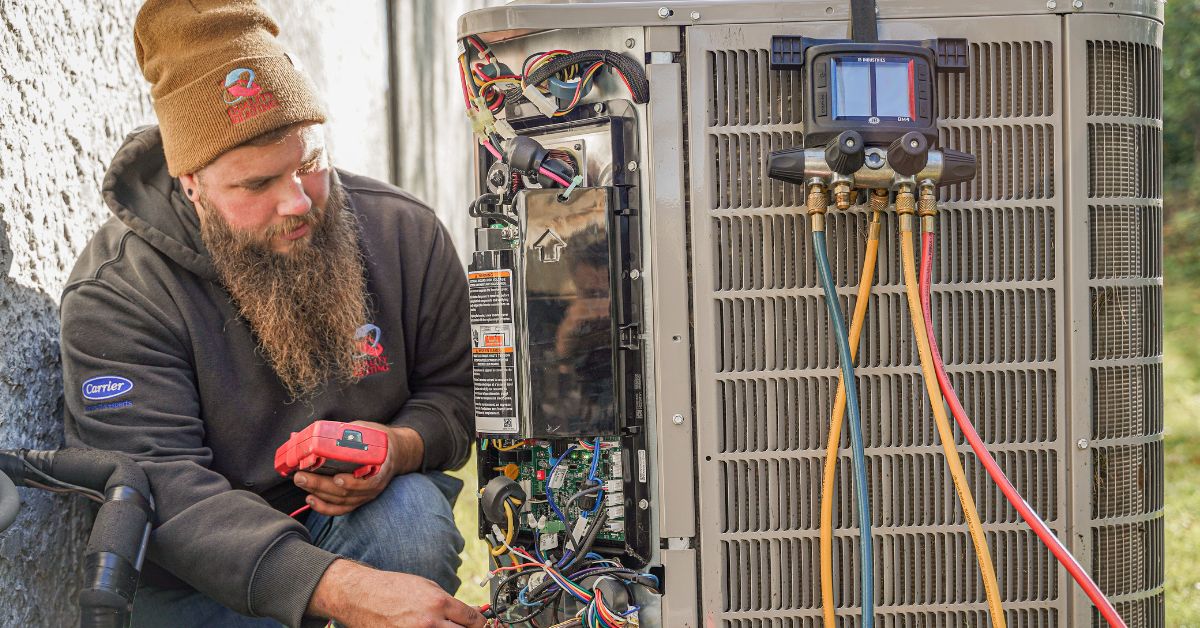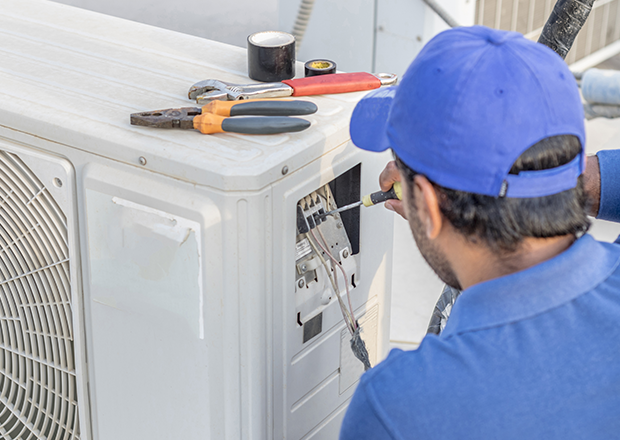Air conditioner repair: truth vs fiction
Wiki Article
The Importance of HVAC Expertise: Uncovering Reasons of Air Conditioner Troubles for Property Owners
House owners often neglect the importance of understanding their HVAC systems. Recognizing usual indicators of a/c problems can lead to prompt treatments. Issues like insufficient air conditioning or unusual noises are not simply inconveniences; they can indicate deeper problems. By checking out the origin of these issues, homeowners can improve system efficiency and prolong its life-span. What are one of the most prevalent issues that can develop, and exactly how can they be successfully addressed?Usual Indicators of Air Conditioning Troubles
Just how can home owners identify problems with their a/c systems prior to they rise? Identifying common indicators of air conditioner issues is vital for prompt upkeep. One widespread indication is inadequate cooling; if the a/c device fails to decrease the indoor temperature, it may indicate underlying concerns. Unusual noises, such as grinding or hissing, can also indicate mechanical failures or loosened parts - HVAC company. Additionally, property owners ought to be skeptical of strange smells emanating from the device, which might suggest mold and mildew development or electric issues. Frequent cycling on and off, recognized as short biking, can show thermostat issues or cooling agent leaks. In addition, a boost in power expenses without a matching increase in usage may indicate ineffectiveness. By remaining alert to these indication, homeowners can avoid a lot more considerable concerns and pricey repairs, ensuring their a/c systems run successfully throughout the warmer months
Understanding Cooling Agent Issues
Refrigerant concerns can considerably affect the performance of an a/c system. Homeowners must understand the indicators of low refrigerant degrees and the relevance of discovering refrigerant leaks. Attending to these troubles quickly can stop additional damage to the system and guarantee optimal cooling efficiency.Reduced Refrigerant Degrees
A typical issue that homeowners may come across with their HVAC systems is low cooling agent levels, which can substantially impact the system's efficiency and efficiency. Cooling agent is important for the cooling procedure, absorbing heat from interior air and releasing it outside. When levels drop, the a/c device struggles to cool down the space effectively, bring about boosted energy usage and prospective system pressure. Signs of low cooling agent include poor cooling, longer run times, and ice formation on the evaporator coils. Property owners might additionally see unusual noises as the compressor works harder to make up for the shortage. It is very important for house owners to comprehend the relevance of keeping proper cooling agent degrees to assure peak heating and cooling efficiency and long life.Refrigerant Leaks Detection
Where might a property owner begin when faced with the opportunity of refrigerant leakages in their cooling and heating system? The initial step involves keeping track of the system's performance. Indications such as decreased cooling down effectiveness, ice formation on coils, or hissing sounds might indicate a refrigerant leak. Property owners ought to additionally inspect for noticeable signs of oil deposit, often a dead giveaway of a leak. Making use of a refrigerant leakage detector can supply more accurate identification. If suspicions persist, seeking advice from a qualified heating and cooling specialist is important, as they have the know-how and tools to locate leaks successfully. Prompt discovery and repair of refrigerant leakages not only enhance system effectiveness yet likewise stop potential ecological harm, making it a vital aspect of cooling and heating upkeep.Electrical Failures and Their Effect
Electric failures can significantly affect heating and cooling systems, specifically via concerns like breaker malfunctions and damaged wiring. These problems not only disrupt the system's performance but can also result in pricey repairs and safety and security threats. Comprehending the implications of such failings is crucial for property owners to preserve an effective and secure a/c setting.Circuit Breaker Issues
How can circuit breaker problems impact the performance of an a/c system? Circuit breakers work as crucial safety devices that handle electrical flow to cooling and heating devices. If a breaker journeys frequently, it interferes with power supply, bring about inconsistent heating or cooling. This can cause significant strain on the system, leading to ineffective procedure and prospective damages to components. Homeowners might discover increased energy costs because of the HVAC system's battle to keep wanted temperatures. In addition, repeated disruptions from stumbled breakers can reduce the lifespan of the AC unit, requiring expensive repair work or substitutes. Routine maintenance of breaker is vital, as it ensures a steady power supply, ultimately enhancing the overall efficiency of the cooling and heating system.Faulty Circuitry Impact
Frequently neglected, malfunctioning wiring can have alarming repercussions for cooling and heating systems. Wiring problems might result in short circuits, leading to constant malfunctions and enhanced repair work expenses. On top of that, incorrect electrical wiring can create inefficient power use, causing greater energy bills and stress on the system. In extreme cases, malfunctioning wiring can set off electrical fires, posing a substantial safety and security danger to property owners. These electric failures can damage Cooling and heating components, resulting in pricey replacements or considerable repair work. Home owners must prioritize routine evaluations by qualified professionals to determine and fix circuitry issues prior to they rise. Comprehending the ramifications of damaged electrical wiring can aid assure the durability and safety and security of cooling and heating systems, inevitably safeguarding both the home and its passengers.Clogged Filters and Their Effects
While many house owners might neglect the importance of normal filter upkeep, clogged up filters can cause significant effects for HVAC systems. When filters come to be obstructed with dust, dust, and particles, air flow is limited. This reduction in air flow forces the system see this website to function harder, leading to raised power usage and potentially greater utility bills. Over time, this strain can create wear and tear on components, leading to early system failure.Additionally, clogged filters can jeopardize interior air quality. Pollutants and irritants may circulate throughout the home, aggravating respiratory system concerns and allergic reactions for occupants. Insufficient air movement can create the evaporator coil to ice up, leading to costly fixings and ineffective air conditioning performance. Frequently transforming or cleansing filters is a straightforward yet vital maintenance task that can help ensure the long life and performance of HVAC systems, inevitably benefiting both the homeowner's comfort and their funds.

Thermostat Malfunctions Described
What takes place when a thermostat breakdowns can greatly affect both convenience and energy effectiveness in a home (Fix broken Air conditioner). A defective thermostat might fall short to accurately check out the temperature level, resulting in overcooling or not enough air conditioning. This discrepancy can trigger pain for owners and lead to greater power bills, as the a/c system functions harder than essentialUsual issues include dead batteries, which can make digital thermostats defective, and loose electrical wiring that disrupts interaction between the thermostat and the HVAC system. Furthermore, obsolete try this out or inadequately adjusted thermostats might not react appropriately to temperature level adjustments, further exacerbating power inefficiency.
House owners ought to be cautious for signs of malfunction, such as inconsistent temperatures or unexpected energy prices. Normal checks and understanding of the thermostat's functionality can assist recognize troubles early, guaranteeing peak performance of the cooling and heating system. Attending to thermostat concerns promptly is vital for keeping a comfortable living setting and handling energy consumption effectively.
The Function of Regular Maintenance
Normal maintenance plays a crucial duty in making sure the durability and efficiency of HVAC systems. Home owners that focus on routine checks can avoid small concerns from intensifying into pricey repair services. Routine maintenance usually includes jobs such as cleaning up filters, inspecting ductwork, and examining cooling agent levels. These tasks aid keep perfect air movement and system performance, lowering energy intake.Furthermore, a properly maintained heating and cooling system runs a lot more efficiently, providing regular comfort throughout the home. Routine tune-ups can likewise expand the lifespan of the system, bring about considerable financial savings over time. House owners are urged to arrange specialist inspections at the very least yearly to recognize potential issues early.
In enhancement, several suppliers need regular maintenance to support guarantees, making this technique not just advantageous yet usually essential. Generally, recognizing the importance of regular upkeep empowers home owners to protect their heating and cooling systems against unexpected failures and boost their financial investment in home convenience.
Frequently Asked Questions
How Can I Boost My Air conditioning's Energy Efficiency?
Improving an AC's power effectiveness includes regular upkeep, cleaning or replacing filters, securing ductwork, making sure proper insulation, utilizing programmable thermostats, and organizing expert inspections to recognize and remedy hvac person potential concerns impacting efficiency.
What Is the Life expectancy of a Common Cooling System?
A common cooling unit has a life expectancy of 15 to two decades, depending on maintenance, use, and ecological factors. Routine maintenance can substantially extend its operational life and improve total performance.
When Should I Replace My A/c System?
An a/c system ought to typically be replaced every 10 to 15 years. Indications for substitute consist of constant repairs, rising energy expenses, and not enough cooling, showing that an upgrade might be extra affordable and effective.Can I Repair Air Conditioner Troubles Myself?
Yes, individuals can repair AC troubles themselves by examining filters, making certain power supply, and inspecting for noticeable concerns (ac unit replacement). Complex troubles commonly need professional assistance for exact diagnosis and safe repair, ensuring ideal system efficiency.
Exactly how Do I Choose a Reliable Cooling And Heating Service Technician?

To select a dependable cooling and heating specialist, one should seek recommendations, inspect on-line evaluations, verify licenses and insurance policy, evaluate experience, and demand detailed quotes to assure quality solution and reasonable pricing prior to deciding.
Conclusion
To summarize, a strong understanding of a/c systems allows home owners to effectively identify and attend to usual a/c problems. Identifying indicators such as poor cooling or climbing power prices enables prompt treatments, which can significantly boost system performance and durability. By staying informed regarding possible issues like cooling agent leaks, electrical failures, and clogged filters, property owners can take positive measures to preserve their systems, ultimately making sure convenience and promoting a much healthier living environment. Routine upkeep continues to be key to this venture.Report this wiki page